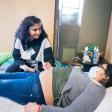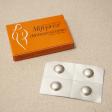Not everyone is willing to dress up like a giant condom on Valentine’s Day. But Dr. Ina Park, Medical Director for the California Prevention Training Center, has always been willing to push boundaries to educate people. Dr. Park noticed in college that she was the person her friends would come to with questions about sex, perhaps because of her pre-med major. She saw a flyer on the UC Berkeley campus looking for people to do just that and became a sexual health peer educator. In addition to donning a costume and demonstrating proper condom use on a banana, she would talk with other students after they received an STI diagnosis or before an HIV test. “I think in those moments of intimacy between myself and the other student, I just understood that I felt really comfortable talking about these issues, and not everybody did,” she says. That experience cemented her desire to become a physician.
While she explored different areas of sexual and reproductive health care, after a fellowship in STIs she couldn’t imagine doing anything else. There was so much potential to have an impact—and so much work to be done. Everybody who has sex gets STIs. Yet some people have traumatic experiences around sexual health in the healthcare system and don’t seek care. Patients experience stigma and feel shame around their diagnoses. “I can be this very sex-positive, normalizing voice and hopefully pivot their attitudes toward STIs in a way that makes their future screening experiences better.”
That drive to change the way people think about STIs inspired her to write her new book, Strange Bedfellows: Adventures in the Science, History and Surprising Secrets of STDs. She felt a sense of helplessness seeing STI rates on the rise. She knew she couldn’t fundamentally change people’s behavior, but she could at least change their attitudes about their experiences with STIs. In the book, Dr. Park takes on STI stigma with a combination of medical information, history, humor and stories from her own life. She hoped that a book that was funny and sex-positive could bring more people in to learn about the topic. And it sounds like that combination has hit the mark. She’s heard from college students who said the book made them feel better about their own diagnoses and they’re recommending it to their friends. Even people who work in sexual and reproductive health say they learned a lot from reading it.
Strange Bedfellows is only the beginning. Dr. Park sees signs that things are moving in the right direction, in part because of access to information through social media. She continues to look for creative ways to engage with the public on this taboo topic, from Instagram videos to media appearances. “I would like people to understand that STIs are a normal consequence of being a sexually active person,” she says. “Instead of being afraid of them, I want people to feel like they’re empowered to take care of their sexual health. I’m hopeful that there will be increased sex positivity for my kids’ generation.”

